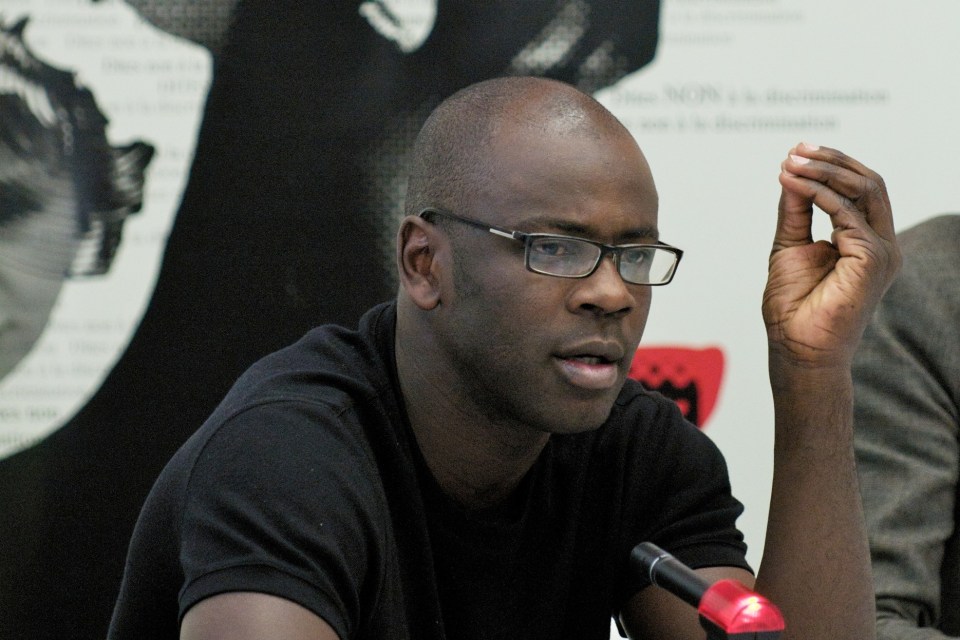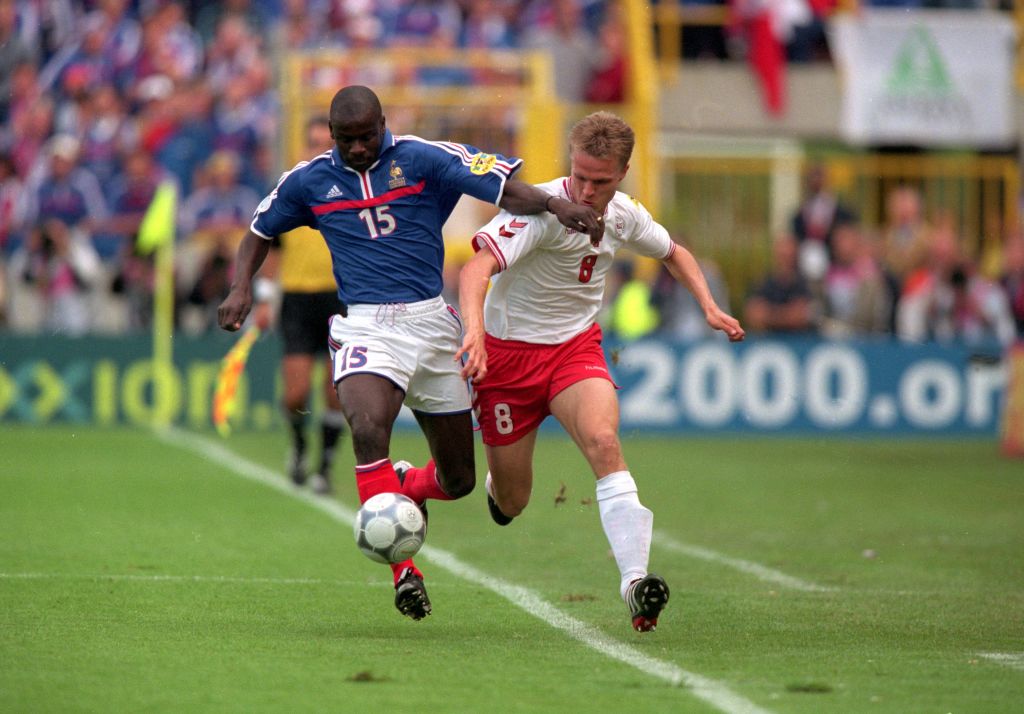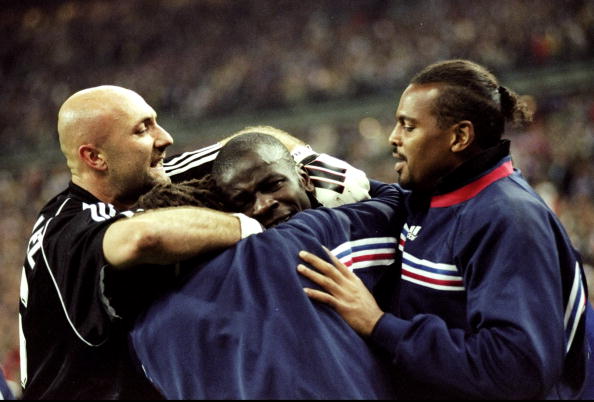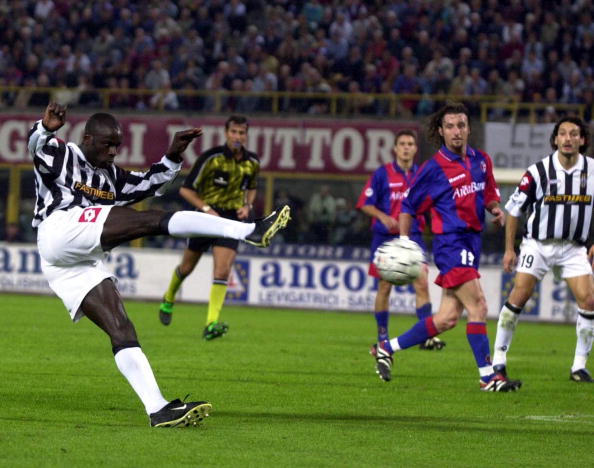Lilian Thuram: Gareth Southgate sets a good example of what white people can do

A bespectacled Lilian Thuram reaches for a map of the world and turns it upside down to illustrate his point.
France’s most capped footballer is sitting at the desk of his office for this video interview, his studious appearance and the shelf full of books behind him indicating the direction he has taken since retiring in 2008.
Thuram is now a writer and social commentator who tackles race and equality with the same intelligence and robustness that made him one of the greatest defenders of his generation.
His latest book, White Thinking: Behind the Mask of Racial Identity, was published in English last month. An examination of what it means to be “white” and how that shapes worldview, the 49-year-old hopes it will provoke vital conversations.
“Racism is a political construct, creating artificial barriers which break the bonds of solidarity between human beings,” Thuram says.
“We inherit certain systems in society and we need to understand how they work so that we can challenge them. We can all be unconsciously biased. We’re not really free thinkers.”
He gestures at the piece of paper he is holding up to the camera on his computer.
“Why is the world map shown with Europe at the centre of the world? Also, think about Christopher Columbus. We say he discovered the New World, the Americas, but there were already native peoples living there. What about their rights and identity?
“We need to question our perspective on race and colour and identity and scrutinise them.”
Thuram on following in the footsteps of Muhammad Ali
Thuram, as should be clear by now, does not fit the mould of the stereotypical former professional footballer.
Instead of following team-mates from the 1998 World Cup winning France side, such as Thierry Henry and Zinedine Zidane, into punditry and coaching, he set up his own foundation aimed at combating racism through education.
His children Marcus and Kephren, who play for Borussia Monchengladbach and Nice, are named after Jamaican activist Marcus Garvey and ancient Egyptian pharaoh Khafre.
“My audience is not just sportspeople but also teachers and educationalists. I use my platform to reach as wide an audience as possible, to encourage dialogue and discussion,” he says.
“Certain far-right people try to delegitimise what I’m doing but that’s because they don’t want to face these issues. I see myself in the lineage of African American sportsmen who spoke out, like Muhammad Ali.”

He has recounted how he only became aware of racial discrimination upon moving to France from Guadeloupe, aged nine. A career in football that gleaned trophies at Monaco, Parma, Juventus and Barcelona opened his eyes further, despite the national team – a blend of white, black and north African players – being celebrated as a model of integration.
“The book is a culmination of a process that has been going on all through my life,” he says.
It is also all the more pertinent in light of recent events in English cricket, where Azeem Rafiq has shone a light on racism that has been allowed to thrive unchecked at club level, at best through a lack of effective action from those running the game.
Players must take lead on fighting racism
Although football is yet to have a Rafiq moment, non-white players still face racism on social media and, to varying degrees in different countries, from the stands. Thuram has seen enough to know that the sport’s governing bodies and power brokers will not lead the way on equality.
“It’s the players who have the most power and influence to change things. All players, whatever their race or colour can have an impact,” he says.
“You can’t wait for institutions to change. It must come from the players. They are the actors. Federations defend the status quo and capitalism.
“It’s important to take a stand against racism. No one can be neutral. If the management and directors of clubs don’t denounce racism then they are tacitly accepting it.”
Thuram supports players and clubs who take the knee – “a political act” – and believes that talking more about racism can bring change.
He wants players’ and managers’ organisations to unite on the issue nationally and internationally. He has already worked with one such group, the US-based Black Players For Change.
“Change has to come from ground level, not those in the stands, the institutions that oversee sport,” he says.
“I welcome what clubs have done so far, as a first step. Taking the knee is a political act. It’s interesting to look at countries whose players take the knee and those whose don’t. It reveals a lot about their attitude to racism.”

Thuram namechecks NBA star Lebron James, Donald Trump-baiting US Women’s World Cup winner Megan Rapinoe and activist NFL player Colin Kaepernick as sportspeople whose stances he admires.
Closer to home, he also singles out socially conscious England stars Marcus Rashford and Jordan Henderson and their national team manager, Gareth Southgate, for special praise.
“Young players like Marcus Rashford can change the mentality of society,” he says. “It’s a hopeful sign, although the majority of black players are frightened of speaking out and challenging the status quo. For example, Kaepernick was kicked out of American football for speaking out.
“That’s why it’s so helpful when white players speak out against racism, like Jordan Henderson. Everyone – black and white – should challenge it. It’s an issue that affects everyone. Martin Luther King brought together all races because the cause was a just one.
“Gareth Southgate’s support is very important. He sets a good example of what white people can do. There aren’t enough like him.”
Thuram: We need to question prejudices
Thuram’s former team-mate Laurent Blanc was accused of racism when the then-France coach was taped discussing the idea of capping the numbers of black and Arab players in the country’s youth teams. Blanc strongly denied racism and was cleared by the French sports minister, who said Blanc had not condoned the proposal.
“Laurent Blanc is someone I know very well. In that situation he didn’t question the racism around him,” says Thuram. “In that infamous meeting racist things were said, but that’s because racist assumptions permeate society. It’s a cultural heritage and very difficult to escape it.
“Received ideas are repeated. We need people to question prejudices, for example that black people are strong and white people are intelligent.
“Someone [not Blanc] once said to me, ‘If I had your physical prowess and my intelligence, I’d be a great player’. It’s the assumption of the intellectual superiority of the white race.”

Thuram says he has been encouraged by the response to his book, which was first published in France last year.
On Monday he will head to London for two events to publicise its arrival in the UK, a launch at the House of Parliament and, later, a seminar and Q&A session at the Institute of Modern Languages Research. This is his life now and he has not looked back since leaving football behind in pursuit of a greater good.
“The foundation is more important to me than football. I launched it when I was still with Barcelona. I knew I wanted to go into this field then,” he says.
“The proof that I made the right decision is that you are interviewing me now about these issues and not about football.”
White Thinking: Behind the Mask of Racial Identity by Lilian Thuram is out now, published by Hero, priced £18.99.
